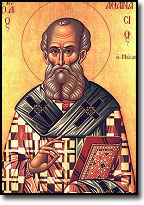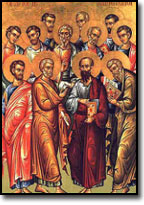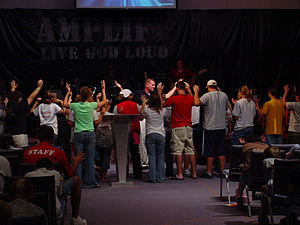The Chicago Statement on Biblical Inerrancy
The Chicago Statement on Biblical Inerrancy
The "Chicago Statement on Biblical Inerrancy" was produced at an international Summit Conference of evangelical leaders, held at the Hyatt Regency O’Hare in Chicago in the fall of 1978. This congress was sponsored by the International Council on Biblical Inerrancy.

 The authority of Scripture is a key issue for the Christian Church in this and every age. Those who profess faith in Jesus Christ as Lord and Savior are called to show the reality of their discipleship by humbly and faithfully obeying God’s written Word. To stray from Scripture in faith or conduct is disloyalty to our Master. Recognition of the total truth and trustworthiness of Holy Scripture is essential to a full grasp and adequate confession of its authority.
The authority of Scripture is a key issue for the Christian Church in this and every age. Those who profess faith in Jesus Christ as Lord and Savior are called to show the reality of their discipleship by humbly and faithfully obeying God’s written Word. To stray from Scripture in faith or conduct is disloyalty to our Master. Recognition of the total truth and trustworthiness of Holy Scripture is essential to a full grasp and adequate confession of its authority.
The following Statement affirms this inerrancy of Scripture afresh, making clear our understanding of it and warning against its denial. We are persuaded that to deny it is to set aside the witness of Jesus Christ and of the Holy Spirit and to refuse that submission to the claims of God’s own Word that marks true Christian faith. We see it as our timely duty to make this affirmation in the face of current lapses from the truth of inerrancy among our fellow Christians and misunderstanding of this doctrine in the world at large.
This Statement consists of three parts: a Summary Statement, Articles of Affirmation and Denial, and an accompanying Exposition. It has been prepared in the course of a three-day consultation in Chicago. Those who have signed the Summary Statement and the Articles wish to affirm their own conviction as to the inerrancy of Scripture and to encourage and challenge one another and all Christians to growing appreciation and understanding of this doctrine. We acknowledge the limitations of a document prepared in a brief, intensive conference and do not propose that this Statement be given creedal weight. Yet we rejoice in the deepening of our own convictions through our discussions together, and we pray that the Statement we have signed may be used to the glory of our God toward a new reformation of the Church in its faith, life and mission.
We offer this Statement in a spirit, not of contention, but of humility and love, which we propose by God’s grace to maintain in any future dialogue arising out of what we have said. We gladly acknowledge that many who deny the inerrancy of Scripture do not display the consequences of this denial in the rest of their belief and behavior, and we are conscious that we who confess this doctrine often deny it in life by failing to bring our thoughts and deeds, our traditions and habits, into true subjection to the divine Word.
We invite response to this Statement from any who see reason to amend its affirmations about Scripture by the light of Scripture itself, under whose infallible authority we stand as we speak. We claim no personal infallibility for the witness we bear, and for any help that enables us to strengthen this testimony to God’s Word we shall be grateful.
I. SUMMARY STATEMENT
1. God, who is Himself Truth and speaks truth only, has inspired Holy Scripture in order thereby to reveal Himself to lost mankind through Jesus Christ as Creator and Lord, Redeemer and Judge. Holy Scripture is God’s witness to Himself.
2. Holy Scripture, being God’s own Word, written by men prepared and superintended by His Spirit, is of infallible divine authority in all matters upon which it touches: It is to be believed, as God’s instruction, in all that it affirms; obeyed, as God’s command, in all that it requires; embraced, as God’s pledge, in all that it promises.
3. The Holy Spirit, Scripture’s divine Author, both authenticates it to us by His inward witness and opens our minds to understand its meaning.
4. Being wholly and verbally God-given, Scripture is without error or fault in all its teaching, no less in what it states about God’s acts in creation, about the events of world history, and about its own literary origins under God, than in its witness to God’s saving grace in individual lives.
5. The authority of Scripture is inescapably impaired if this total divine inerrancy is in any way limited or disregarded, or made relative to a view of truth contrary to the Bible’s own; and such lapses bring serious loss to both the individual and the Church.
II. ARTICLES OF AFFIRMATION AND DENIAL
Article I.
We affirm that the Holy Scriptures are to be received as the authoritative Word of God.
We deny that the Scriptures receive their authority from the Church, tradition, or any other human source.
Article II.
We affirm that the Scriptures are the supreme written norm by which God binds the conscience, and that the authority of the Church is subordinate to that of Scripture.
We deny that church creeds, councils, or declarations have authority greater than or equal to the authority of the Bible.
Article III.
We affirm that the written Word in its entirety is revelation given by God.
We deny that the Bible is merely a witness to revelation, or only becomes revelation in encounter, or depends on the responses of men for its validity.
Article IV.
We affirm that God who made mankind in His image has used language as a means of revelation.
We deny that human language is so limited by our creatureliness that it is rendered inadequate as a vehicle for divine revelation. We further deny that the corruption of human culture and language through sin has thwarted God’s work of inspiration.
Article V.
We affirm that God’s revelation in the Holy Scriptures was progressive.
We deny that later revelation, which may fulfill earlier revelation, ever corrects of contradicts it. We further deny that any normative revelation has been given since the completion of the New Testament writings.
Article VI.
We affirm that the whole of Scripture and all its parts, down to the very words of the original, were given by divine inspiration.
We deny that the inspiration of Scripture can rightly be affirmed of the whole without the parts, or of some parts but not the whole.
Article VII.
We affirm that inspiration was the work in which God by His Spirit, through human writers, gave us His Word. The origin of Scripture is divine. The mode of divine inspiration remains largely a mystery to us.
We deny that inspiration can be reduced to human insight, or to heightened states of consciousness of any kind.
Article VIII.
We affirm that God in His work of inspiration utilized the distinctive personalities and literary styles of the writers whom He had chosen and prepared.
We deny that God, in causing these writers to use the very words that He chose, overrode their personalities.
Article IX.
We affirm that inspiration, through not conferring omniscience, guaranteed true and trustworthy utterance on all matters of which the Biblical authors were moved to speak and write.
We deny that the finitude or falseness of these writers, by necessity or otherwise, introduced distortion or falsehood into God’s Word.
Article X.
We affirm that inspiration, strictly speaking, applies only to the autographic text of Scripture, which in the providence of God can be ascertained from available manuscripts with great accuracy. We further affirm that copies and translations of Scripture are the Word of God to the extent that they faithfully represent the original.
We deny that any essential element of the Christian faith is affected by the absence of the autographs. We further deny that this absence renders the assertion of Biblical inerrancy invalid or irrelevant.
Article XI.
We affirm that Scripture, having been given by divine inspiration, is infallible, so that, far from misleading us, it is true and reliable in all the matters it addresses.
We deny that it is possible for the Bible to be at the same time infallible and errant in its assertions. Infallibility and inerrancy may be distinguished but not separated.
Article XII.
We affirm that Scripture in its entirety is inerrant, being free from all falsehood, fraud, or deceit.
We deny that Biblical infallibility and inerrancy are limited to spiritual, religious, or redemptive themes, exclusive of assertions in the fields of history and science. We further deny that scientific hypotheses about earth history may properly be used to overturn the teaching of Scripture on creation and the flood.
Article XIII.
We affirm the propriety of using inerrancy as a theological term with reference to the complete truthfulness of Scripture.
We deny that it is proper to evaluate Scripture according to standards of truth and error that are alien to its usage or purpose. We further deny that inerrancy is negated by Biblical phenomena such as a lack of modern technical precision, irregularities of grammar or spelling, observational descriptions of nature, the reporting of falsehoods, the use of hyperbole and round numbers, the topical arrangement of metrical, variant selections of material in parallel accounts, or the use of free citations.
Article XIV.
We affirm the unity and internal consistency of Scripture.
We deny that alleged errors and discrepancies that have not yet been resolved violate the truth claims of the Bible.
Article XV.
We affirm that the doctrine of inerrancy is grounded in the teaching of the Bible about inspiration.
We deny that Jesus’ teaching about Scripture may be dismissed by appeals to accommodation or to any natural limitation of His humanity.
Article XVI.
We affirm that the doctrine of inerrancy has been integral to the Church’s faith throughout its history.
We deny that inerrancy is a doctrine invented by scholastic Protestantism, or is a reactionary position postulated in response to negative higher criticism.
Article XVII.
We affirm that the Holy Spirit bears witness to the Scriptures, assuring believers of the truthfulness of God’s written Word.
We deny that this witness of the Holy Spirit operates in isolation from or against Scripture.
Article XVIII.
We affirm that the text of Scripture is to be interpreted by grammatico-historical exegesis, taking account of its literary forms and devices, and that Scripture is to interpret Scripture.
We deny the legitimacy of any treatment of the text or quest for sources lying behind it that leads or relativizing, dehistoricizing, or discounting its teaching, or rejecting its claims of authorship.
Article XIX.
We affirm that a confession of the full authority, infallibility and inerrancy of Scripture is vital to a sound understanding of the whole of the Christian faith. We further affirm that such confession should lead to increasing conformity to the image of Christ.
We deny that such confession is necessary for salvation. However, we further deny that inerrancy can be rejected without grave consequences, both to the individual and to the Church.
III. EXPOSITION
Our understanding of the doctrine of inerrancy must be set in the context of the broader teachings of Scripture concerning itself. This exposition gives an account of the outline of doctrine from which our Summary Statement and Articles are drawn.
A. Creation, Revelation and Inspiration
The God, who formed all things by his creative utterances and governs all things by His Word of decree, made mankind in His own image for a life of communion with Himself, on the model of the eternal fellowship of loving communication within the Godhead. As God’s image-bearer, man was to hear God’s Word addressed to him and to respond in the joy of adoring obedience. Over and above God’s self-disclosure in the created order and the sequence of events within it, human beings from Adam on have received verbal messages from Him, either directly, as stated in Scripture, or indirectly in the form of part or all of Scripture itself.
When Adam fell, the Creator did not abandon mankind to final judgment, but promised salvation and began to reveal Himself as Redeemer in a sequence of historical events centering on Abraham’s family and culminating in the life, death, resurrection, present heavenly ministry and promised return of Jesus Christ. Within this frame God has from time to time spoken specific words of judgment and mercy, promise and command, to sinful human beings, so drawing them into a covenant relation of mutual commitment between Him and them in which He blesses them with gifts of grace and they bless Him in responsive adoration. Moses, whom God used as mediator to carry his words to His people at the time of the exodus, stands at the head of a long line of prophets in whose mouths and writings God put His words for delivery to Israel. God’s purpose in this succession of messages was to maintain His covenant by causing His people to know
His name — that is, His nature — and His will both of precept and purpose in the present and for the future. This line of prophetic spokesmen from God came to completion in Jesus Christ, God’s incarnate Word, who was Himself a prophet — more that a prophet, but not less — and in the apostles and prophets of the first Christian generation. When God’s final and climactic message, His word to the world concerning Jesus Christ, had been spoken and elucidated by those in the apostolic circle, the sequence of revealed messages ceased. Henceforth the Church was to live and know God by what He had already said, and said for all time.
At Sinai God wrote the terms of His covenant on tablets of stone as His enduring witness and for lasting accessibility, and throughout the period of prophetic and apostolic revelation He prompted men to write the messages given to and through them, along with celebratory records of His dealings with His people, plus moral reflections on covenant life and forms of praise and prayer for covenant mercy. The theological reality of inspiration in the producing of Biblical documents corresponds to that of spoken prophecies: Although the human writers’ personalities were expressed in what they wrote, the words were divinely constituted.
Thus what Scripture says, God says; its authority is His authority, for He is its ultimate Author, having given it through the minds and words of chosen and prepared men who in freedom and faithfulness "spoke from God as they were carried along by the Holy Spirit" (2 Pet 1:21). Holy Scripture must be acknowledged as the Word of God by virtue of its divine origin.
B. Authority: Christ and the Bible
Jesus Christ, the Son of God who is the Word made flesh, our Prophet, Priest and King, is the ultimate Mediator of God’s communication to man, as He is of all God’s gifts of grace. The revelation He gave was more that verbal; He revealed the Father by His presence and His deeds as well. Yet His words were crucially important ; for He was God, He spoke from the Father, and His words will judge all men at the last day.
As the prophesied Messiah, Jesus Christ is the central theme of Scripture. The Old Testament looked ahead to Him; the New Testament looks back to His first coming and on to His second. Canonical Scripture is the divinely inspired and therefore normative witness to Christ. No hermeneutic, therefore, of which the historical Christ is not the focal point is acceptable. Holy Scripture must be treated as what it essentially is — the witness of the Father to the incarnate Son.
It appears that the Old Testament canon had been fixed by the time of Jesus. The New Testament canon is likewise now closed, inasmuch as no new apostolic witness to the historical Christ can now be borne. No new revelation (as distinct from Spirit-given understanding of existing revelation) will be given until Christ comes again. The canon was created in principle by divine inspiration. The Church’s part was to discern the canon that God had created, not to devise one of its own.
The word ‘canon’, signifying a rule of standard, is a pointer to authority, which means the right to rule and control. Authority in Christianity belongs to God in His revelation, which means, on the one hand, Jesus Christ, the living Word, and, on the other hand, Holy Scripture, the written Word. But the authority of Christ and that of Scripture are one. As our Prophet, Christ testified that Scripture cannot be broken. As our Priest and King, He devoted His earthly life to fulfilling the law and the prophets, even dying in obedience to the words of messianic prophecy. Thus as He saw Scripture attesting Him and His authority, so by His own submission to Scripture He attested its authority. As He bowed to His Father’s instruction given in His Bible (our Old Testament), so He requires His disciples to do — not, however, in isolation but in conjunction with the apostolic witness to Himself that He undertook to inspire by his gift of the Holy Spirit. So Christians show themselves faithful servants of their Lord by bowing to the divine instruction given in the prophetic and apostolic writings that together make up our Bible.
By authenticating each other’s authority, Christ and Scripture coalesce into a single fount of authority. The Biblically-interpreted Christ and the Christ-centered, Christ-proclaiming Bible are from this standpoint one. As from the fact of inspiration we infer that what Scripture says, God says, so from the revealed relation between Jesus Christ and Scripture we may equally declare that what Scripture says, Christ says.
C. Infallibility, Inerrancy, Interpretation
Holy Scripture, as the inspired Word of God witnessing authoritatively to Jesus Christ, may properly be called ‘infallible’ and ‘inerrant’. These negative terms have a special value, for they explicitly safeguard crucial positive truths.
‘Infallible’ signifies the quality of neither misleading nor being misled and so safeguards in categorical terms the truth that Holy Scripture is a sure, safe and reliable rule and guide in all matters.
Similarly, ‘inerrant’ signifies the quality of being free from all falsehood or mistake and so safeguards the truth that Holy Scripture is entirely true and trustworthy in all its assertions.
We affirm that canonical Scripture should always be interpreted on the basis that it is infallible and inerrant. However, in determining what the God-taught writer is asserting in each passage, we must pay the most careful attention to its claims and character as a human production. In inspiration, God utilized the culture and conventions of his penman’s milieu, a milieu that God controls in His sovereign providence; it is misinterpretation to imagine otherwise.
So history must be treated as history, poetry as poetry, hyperbole and metaphor as hyperbole and metaphor, generalization and approximation as what they are, and so forth. Differences between literary conventions in Bible times and in ours must also be observed: Since, for instance, nonchronological narration and imprecise citation were conventional and acceptable and violated no expectations in those days, we must not regard these things as faults when we find them in Bible writers. When total precision of a particular kind was not expected nor aimed at, it is no error not to have achieved it. Scripture is inerrant, not in the sense of being absolutely precise by modern standards, but in the sense of making good its claims and achieving that measure of focused truth at which its authors aimed.
The truthfulness of Scripture is not negated by the appearance in it of irregularities of grammar or spelling, phenomenal descriptions of nature, reports of false statements (for example, the lies of Satan), or seeming discrepancies between one passage and another. It is not right to set the so-called "phenomena" of Scripture against the teaching of Scripture about itself. Apparent inconsistencies should not be ignored.
Solution of them, where this can be convincingly achieved, will encourage our faith, and where for the present no convincing solution is at hand we shall significantly honor God by trusting His assurance that His Word is true, despite these appearances, and by maintaining our confidence that one day they will be seen to have been illusions.
Inasmuch as all Scripture is the product of a single divine mind, interpretation must stay within the bounds of the analogy of Scripture and eschew hypotheses that would correct one Biblical passage by another, whether in the name of progressive revelation or of the imperfect enlightenment of the inspired writer’s mind.
Although Holy Scripture is nowhere culture-bound in the sense that its teaching lacks universal validity, it is sometimes culturally conditioned by the customs and conventional views of a particular period, so that the application of its principles today calls for a different sort of action.
D. Skepticism and Criticism
Since the Renaissance, and more particularly since the Enlightenment, world views have been developed that involve skepticism about basic Christian tenets. Such are the agnosticism that denies that God is knowable, the rationalism that denies that He is incomprehensible, the idealism that denies that He is transcendent, and the existentialism that denies rationality in His relationships with us. When these un- and anti-Biblical principles seep into men’s theologies at presuppositional level, as today they frequently do, faithful interpretation of Holy Scripture becomes impossible.
E. Transmission and Translation
Since God has nowhere promised an inerrant transmission of Scripture, it is necessary to affirm that only the autographic text of the original documents was inspired and to maintain the need of textual criticism as a means of detecting any slips that may have crept into the text in the course of its transmission. The verdict of this science, however, is that the Hebrew and Greek text appears to be amazingly well preserved, so that we are amply justified in affirming, with the Westminster Confession, a singular providence of God in this matter and in declaring that the authority of Scripture is in no way jeopardized by the fact that the copies we possess are not entirely error-free.
Similarly, no translation is or can be perfect, and all translations are an additional step away from the autograph. Yet the verdict of linguistic science is that English-speaking Christians, at least, are exceedingly well served in these days with a host of excellent translations and have no cause for hesitating to conclude that the true Word of God is within their reach. Indeed, in view of the frequent repetition in Scripture of the main matters with which it deals and also of the Holy Spirit’s constant witness to and through the Word, no serious translation of Holy Scripture will so destroy its meaning as to render it unable to make its reader "wise for salvation through faith in Christ Jesus" (2 Tim. 3:15).
F. Inerrancy and Authority
In our affirmation of the authority of Scripture as involving its total truth, we are consciously standing with Christ and His apostles, indeed with the whole Bible and with the main stream of Church history from the first days until very recently. We are concerned at that casual, inadvertent and seemingly thoughtless way in which a belief of such far-reaching importance has been given up by so many in our day.
We are conscious too that great and grave confusion results from ceasing to maintain the total truth of the Bible whose authority one professes to acknowledge. The result of taking this step is that the Bible that God gave loses its authority, and what has authority instead is a Bible reduced in content according to the demands of one’s critical reasoning and in principle reducible still further once one has started. This means that at bottom independent reason now has authority, as opposed to Scriptural teaching. If this is not seen and if for the time being basic evangelical doctrines are still held, persons denying the full truth of Scripture may claim an evangelical identity while methodologically they have moved away from the evangelical principle of knowledge to an unstable subjectivism, and will find it hard not to move further.
We affirm that what Scripture says, God says. May He be glorified.
Amen and Amen.


 Whosoever will be saved, before all things it is necessary that he hold the catholic faith. Which faith except everyone do keep whole and undefiled, without doubt he shall perish everlastingly. And the catholic faith is this: That we worship one God in Trinity, and Trinity in Unity, neither confounding the persons, nor dividing the substance.
Whosoever will be saved, before all things it is necessary that he hold the catholic faith. Which faith except everyone do keep whole and undefiled, without doubt he shall perish everlastingly. And the catholic faith is this: That we worship one God in Trinity, and Trinity in Unity, neither confounding the persons, nor dividing the substance. Next to the Nicene Creed, the Apostles’ Creed is the most universally accepted doctrinal statement in Christendom. It grew from a baptismal formula, and is now often incorporated in the liturgy of regular Sunday services.
Next to the Nicene Creed, the Apostles’ Creed is the most universally accepted doctrinal statement in Christendom. It grew from a baptismal formula, and is now often incorporated in the liturgy of regular Sunday services.  The Protestant Reformation began on the eve of All Souls’ Day, October 31, 1517. On that day, Martin Luther (1483-1546), professor of biblical studies at the newly founded University of Wittenburg in Germany, announced a disputation on indulgences. He stated his argument in 95 Theses. Though they were heavily academic, and moderate in tone, news of them spread like wildfire throughout Europe.1
The Protestant Reformation began on the eve of All Souls’ Day, October 31, 1517. On that day, Martin Luther (1483-1546), professor of biblical studies at the newly founded University of Wittenburg in Germany, announced a disputation on indulgences. He stated his argument in 95 Theses. Though they were heavily academic, and moderate in tone, news of them spread like wildfire throughout Europe.1 Pastor Gary and Pam Kruzan pioneered and have been pastoring Faith Christian Family Church in Rushville, Illinois, since 1987. Though their location is in a small rural town, their vision is anything but small. God has used them in a wonderful way to not only build a strong local church, but also to build an outstanding youth camp that is now reaching hundreds of teens every summer.
Pastor Gary and Pam Kruzan pioneered and have been pastoring Faith Christian Family Church in Rushville, Illinois, since 1987. Though their location is in a small rural town, their vision is anything but small. God has used them in a wonderful way to not only build a strong local church, but also to build an outstanding youth camp that is now reaching hundreds of teens every summer. Every year we receive testimonies of first time salvations, baptisms in the Holy Ghost, and healings all stemming from our focus on spreading the Gospel to young people.
Every year we receive testimonies of first time salvations, baptisms in the Holy Ghost, and healings all stemming from our focus on spreading the Gospel to young people. We believe God for 300 partners to pledge $10.00 a month to the camp. We are close to reaching our goal, but still need more help. Having partners allows us to keep the cost down so more campers can attend. If you are interested in partnering with us, please contact Faith Christian Family Church at (217) 322-6929. All forms and information regarding camp registration can be found at
We believe God for 300 partners to pledge $10.00 a month to the camp. We are close to reaching our goal, but still need more help. Having partners allows us to keep the cost down so more campers can attend. If you are interested in partnering with us, please contact Faith Christian Family Church at (217) 322-6929. All forms and information regarding camp registration can be found at 
 With a background in opera, and a heart for ministry, Carol Wyatt presents "Hymns: Timeless Classics."
With a background in opera, and a heart for ministry, Carol Wyatt presents "Hymns: Timeless Classics." 
 I thoroughly enjoyed reading, What I Learned While Destroying a Church, by Gerald Brooks. Gerald candidly shares the mistakes he made and the lessons he learned from pastoring his first church-a church that no longer exists. The principles contained in this book are valuable and can save young ministers many heartaches. Young pastors need these truths, and seasoned pastors will appreciate them.
I thoroughly enjoyed reading, What I Learned While Destroying a Church, by Gerald Brooks. Gerald candidly shares the mistakes he made and the lessons he learned from pastoring his first church-a church that no longer exists. The principles contained in this book are valuable and can save young ministers many heartaches. Young pastors need these truths, and seasoned pastors will appreciate them. An overseas Bible School recently inquired about books to use in training future pastors to be more effective in offering spiritual and biblical guidance. Tony recently surveyed five professional Christian counselors about this, and here are their recommendations.
An overseas Bible School recently inquired about books to use in training future pastors to be more effective in offering spiritual and biblical guidance. Tony recently surveyed five professional Christian counselors about this, and here are their recommendations. Question: Tony, do you have any resources about the types of questions a prospective pastor should ask to a “pulpit committee” that is considering him as their new pastor?
Question: Tony, do you have any resources about the types of questions a prospective pastor should ask to a “pulpit committee” that is considering him as their new pastor?